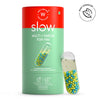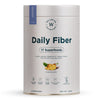While we often associate cholesterol with health risks, the truth is, that it plays a crucial role in our body, from cell function to hormone production. The challenge isn’t cholesterol itself, but rather maintaining the right balance. When LDL (the ‘bad’ cholesterol) creeps too high, and HDL (the ‘good’ cholesterol) isn’t enough, the risk of heart disease and other complications increases.
The good thing is that you have more control than you think. With the right lifestyle choices, nourishing foods, and nature’s support, keeping cholesterol in check can become a seamless part of your routine. Whether you’re looking to prevent future issues or actively working on managing cholesterol, these science-backed strategies will empower you to take charge of your heart health with confidence.
Let’s dive into practical, sustainable tips to lower cholesterol and build a heart-healthy future.
1. Know Your Numbers
Before making changes, it’s essential to understand where you stand. A simple blood test will reveal your total cholesterol levels, breaking it down into LDL (low-density lipoprotein, aka the ‘bad’ cholesterol), HDL (high-density lipoprotein, the ‘good’ cholesterol), and triglycerides. Keeping LDL low and HDL high is the goal. Knowing your baseline will help you track progress as you incorporate cholesterol control strategies into your daily routine.
2. Upgrade Your Diet with Heart-Healthy Choices
Food is one of the most powerful tools for managing cholesterol. Swapping out unhealthy fats and processed foods for heart-friendly alternatives can make a world of difference. Focus on:
-
Fiber-rich foods: Oats, flaxseeds, lentils, beans, and vegetables help reduce LDL levels by promoting better digestion and limiting cholesterol absorption.
-
Healthy fats: Avocados, nuts, seeds, and olive oil provide essential nutrients without the harmful saturated fats found in fried or processed foods.
-
Natural plant sterols: Found in nuts, seeds, and some fortified foods, these compounds mimic cholesterol in the body, helping to block its absorption and naturally lower LDL.
-
Omega-3-rich foods: Fatty fish like salmon, mackerel, and sardines help increase HDL while reducing inflammation.
3. Make Exercise a Habit
You don’t have to run a marathon, but incorporating simple exercises is key to keeping your heart in top shape. Regular physical activity helps raise HDL cholesterol while lowering LDL and triglycerides. Aim for at least 150 minutes of moderate-intensity exercise per week—think brisk walking, swimming, or cycling. Strength training twice a week is also beneficial for overall cardiovascular health.
4. Cut Down on Sugar and Processed Foods
It’s easy to blame fatty foods for high cholesterol, but sugar plays a significant role too. Excess sugar in processed snacks, sodas, and refined carbs triggers the liver to produce more LDL while lowering HDL. Swapping out refined grains for whole grains, choosing natural sweeteners in moderation, and focusing on whole, unprocessed foods can drastically improve cholesterol control.
5. Manage Stress for a Healthy Heart
Chronic stress impacts every aspect of your health, including your cholesterol levels. When stress hormones like cortisol spike, so does LDL cholesterol. Incorporating stress management techniques like deep breathing, yoga, meditation, and spending time in nature can support overall well-being and help keep cholesterol in check.
6. Choose Supplements That Work with Your Body
While lifestyle and diet are the foundations of managing cholesterol, natural supplements can offer additional support. Certain plant-based extracts, such as those containing natural plant sterols and heart-supportive herbs, help the body maintain optimal cholesterol levels without relying on synthetic solutions. When choosing a supplement, look for one backed by science and formulated with high-quality, natural ingredients.
7. Prioritize Quality Sleep
Believe it or not, your sleep habits impact your cholesterol levels. Poor sleep is linked to higher LDL and triglyceride levels, along with an increased risk of heart disease. Aim for at least seven to eight hours of quality rest each night to support heart health.
8. Stay Consistent and Monitor Progress
Regular check-ups with your doctor, tracking your numbers, and adjusting your lifestyle accordingly will help you stay on the right path.
The Bottom Line
Managing Cholesterol doesn’t have to be overwhelming. With mindful food choices, regular movement, stress management, and high-quality, plant-based support, you can take control of your heart health naturally. The goal isn’t just to lower numbers—it’s to build a lifestyle that supports longevity, energy, and overall well-being. Here’s to a heart that beats strong, today and always.

































